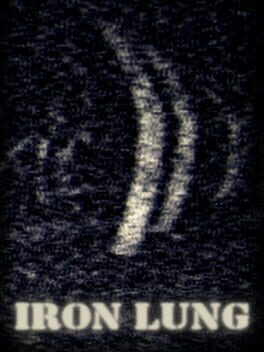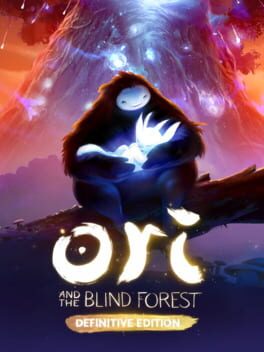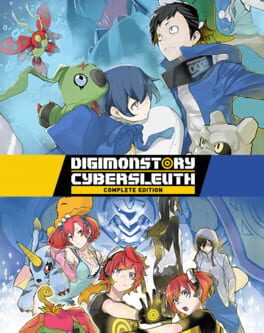lavi
2022
I love how the movement in this game feels- Ori is lightweight and fluid, dashing in and out and over obstacles with ease. The game doesn't feel unfairly hard- if I make a mistake and die, I can easily understand why it happened and how i should start fixing the issue. The story is emotional despite not having any dialogue, and though it's perhaps not the most unique, it's still full of potential as a heartwarmer and tearjerker both.
The "boss" battles of the game are intense chase sequences which test your mastery of new abilities, and they're full of a healthy adrenaline. Unfortunately, some parts can have /very/ steep reaction time requirements, and it can sometimes feel like you're intended to die as a learning experience and start over, instead of escaping by the skin of your teeth. This interruption of flow can be very jarring!
The music and the art, are, of course, top notch, and I don't think there's a single moment in the game that looks or sounds bad.
The "boss" battles of the game are intense chase sequences which test your mastery of new abilities, and they're full of a healthy adrenaline. Unfortunately, some parts can have /very/ steep reaction time requirements, and it can sometimes feel like you're intended to die as a learning experience and start over, instead of escaping by the skin of your teeth. This interruption of flow can be very jarring!
The music and the art, are, of course, top notch, and I don't think there's a single moment in the game that looks or sounds bad.
This game is bland most of the time, full of grinding, the story is mediocre.. but when I set all that aside and make this my comforting dollar menu fast food game, I love it. I played it for over a hundred hours and don't regret it, even if I don't think the game is objectively good.
Arata is by and large the highlight of the first game for me, and with the exception of the main character, the cast of Hacker's Memory are all pretty good. Hackers' Memory improves on Cyber Sleuth in a lot of ways, but I can't help but wish it was it's own game. HM feels very tacked on, which doesn't let it's own characters shine. That said, I appreciated the deepening of Arata's character that HM allows for.
Arata is by and large the highlight of the first game for me, and with the exception of the main character, the cast of Hacker's Memory are all pretty good. Hackers' Memory improves on Cyber Sleuth in a lot of ways, but I can't help but wish it was it's own game. HM feels very tacked on, which doesn't let it's own characters shine. That said, I appreciated the deepening of Arata's character that HM allows for.
2021
This review contains spoilers
Inscryption boasts a beautiful beginning with charming dialogue and wonderfully done atmosphere. Act 1 is a visual treat and, had it been the entirety of the game, would have honestly garnered more love from me. The rules are simple enough to learn quickly, with enough variation and ways to augment your cards that you can play all sorts of different ways. The boss fights in the cabin are lovely, too; the dark aesthetic marries perfectly with the haunting soundtrack, and the mechanics are all perfectly in theme with the boss, as well.
Unfortunately, the game drops off quite hard after this. It may be a staple of Daniel Mullin's work, but the meta-fictional plot is unengaging and underwhelming. I'm far more interested in the world inside the game, and I could feel all of my immersion get forcibly torn away each time I was forced to sit through a segment involving 'the real world.' The game's plot and characters suffer for this, in my opinion, as so much time is diverted away from the Scrybes and into Lucas Carder. The fact Luke will occasionally quip in over your gameplay, just after enough time has passed for you to forget he existed, was nothing short of irritating.
Act 3, at least for me, wasn't so terrible, though it certainly was /boring/ both to look at and read. The card game, however, was back to being reminiscent of the cabin, and I was pleased to go back to it with a fresh new set of mechanics. This does come with the caveat of the game playing much slower than before, though, so make what you will of it.
The half-baked plot concludes with one final stand against each of the Scrybes, though all are cut short. I for one, actually quite enjoyed this! It looked amazing, and gave me a taste of the decks I hadn't really been able to enjoy in the slog of the second act. Unfortunately, as cool as the set piece is, the Scrybes are neutered for plot-reasons and you may only play a few turns with each one before moving on. This segment simply furthered my need for the game to throw away the focus on the metafictional: I would happily play a game going through the worlds of each Scrybe, as you had done with Leshy's cabin, and enjoyed it much more than the actual product.
After this, the finale to the plot is... unsatisfying, at best, and honestly, comes off as downright laughable. Why should I care for Lucas Carder, or anything that happens to him? Why should I feel horror at PO-3's actions? What is the truth behind the mysterious card-turned-video-game? I've played other games that leave me turning questions such as these over in my head for weeks afterwards (shoutout to Signalis!), but with Inscryption, I felt no attachment to any of it. Honestly, I wanted the credits to roll faster, so I could get back to playing the cabin card game in Kaycee's Mod.
I don't think that Inscryption is bad at a base level. It's a fun game bogged down by terrible writing, leaving a perfectly mediocre experience. But I don't want a mediocre game, I want a game that continues to channel the fun and wonder I had at the start.
Unfortunately, the game drops off quite hard after this. It may be a staple of Daniel Mullin's work, but the meta-fictional plot is unengaging and underwhelming. I'm far more interested in the world inside the game, and I could feel all of my immersion get forcibly torn away each time I was forced to sit through a segment involving 'the real world.' The game's plot and characters suffer for this, in my opinion, as so much time is diverted away from the Scrybes and into Lucas Carder. The fact Luke will occasionally quip in over your gameplay, just after enough time has passed for you to forget he existed, was nothing short of irritating.
Act 3, at least for me, wasn't so terrible, though it certainly was /boring/ both to look at and read. The card game, however, was back to being reminiscent of the cabin, and I was pleased to go back to it with a fresh new set of mechanics. This does come with the caveat of the game playing much slower than before, though, so make what you will of it.
The half-baked plot concludes with one final stand against each of the Scrybes, though all are cut short. I for one, actually quite enjoyed this! It looked amazing, and gave me a taste of the decks I hadn't really been able to enjoy in the slog of the second act. Unfortunately, as cool as the set piece is, the Scrybes are neutered for plot-reasons and you may only play a few turns with each one before moving on. This segment simply furthered my need for the game to throw away the focus on the metafictional: I would happily play a game going through the worlds of each Scrybe, as you had done with Leshy's cabin, and enjoyed it much more than the actual product.
After this, the finale to the plot is... unsatisfying, at best, and honestly, comes off as downright laughable. Why should I care for Lucas Carder, or anything that happens to him? Why should I feel horror at PO-3's actions? What is the truth behind the mysterious card-turned-video-game? I've played other games that leave me turning questions such as these over in my head for weeks afterwards (shoutout to Signalis!), but with Inscryption, I felt no attachment to any of it. Honestly, I wanted the credits to roll faster, so I could get back to playing the cabin card game in Kaycee's Mod.
I don't think that Inscryption is bad at a base level. It's a fun game bogged down by terrible writing, leaving a perfectly mediocre experience. But I don't want a mediocre game, I want a game that continues to channel the fun and wonder I had at the start.
2012
Visiting a game i used to love as a young teen can be painful, sometimes. As much as I used to adore this game, a replay a decade later really hurt my perception of it. Easily my least favorite in the set of modern Persona games.
A lot of character development and writing seems to cross back on itself; characters arcs culminate in them "accepting their true self", but largely find themselves turning right back to the life they were resigned to before. Accepting your true feelings is different from resigning yourself to your fate, and almost no one in the game seems to /really/ want to change their situation. It rubs me the wrong way that the theme of the game is accepting yourself, your differences, and how you truly feel, only for characters to swallow their own feelings back down and 'overcome' their problems by becoming comfortable with what had hurt them in the first place.
Another issue I have with Persona 4 is one well known; homophobia and misogyny run rampant through the game as gags, and even for a 2008 game, it can definitely go far beyond uncomfortable (hello, camping trip assault joke!). I don't really need to talk more about this- it's been talked about time and time again, and plays into the same issue I have with the rest of the character arcs.
There's things I still like about this game- the music is fantastic, and the country town setting feels perfectly isolated and empty, paving way for the high-school friendships to feel like they mean more. The later third of the game where the fog sets in, Magatsu-Inaba, and Hollow Forest look and feel amazing. I really wish the game had leaned more into this, rather than a majority of the game being spent whittling days away just.. hanging out and doing goofy anime high-schooler things.
I also have to give special note to the Dojima family- Nanako and Dojima's dynamic is easily my favorite part of the game, far more than any of the relationships between the Investigation Team, which I find pretty one-note.
All in all, I just.. don't love this game anymore. It's a somber feeling to say I honestly actively dislike something that was so important to me for so long. But some parts of it are still fun and enjoyable, and some form of nostalgia and warmth keeps me from calling it a bad game with my full heart.
A lot of character development and writing seems to cross back on itself; characters arcs culminate in them "accepting their true self", but largely find themselves turning right back to the life they were resigned to before. Accepting your true feelings is different from resigning yourself to your fate, and almost no one in the game seems to /really/ want to change their situation. It rubs me the wrong way that the theme of the game is accepting yourself, your differences, and how you truly feel, only for characters to swallow their own feelings back down and 'overcome' their problems by becoming comfortable with what had hurt them in the first place.
Another issue I have with Persona 4 is one well known; homophobia and misogyny run rampant through the game as gags, and even for a 2008 game, it can definitely go far beyond uncomfortable (hello, camping trip assault joke!). I don't really need to talk more about this- it's been talked about time and time again, and plays into the same issue I have with the rest of the character arcs.
There's things I still like about this game- the music is fantastic, and the country town setting feels perfectly isolated and empty, paving way for the high-school friendships to feel like they mean more. The later third of the game where the fog sets in, Magatsu-Inaba, and Hollow Forest look and feel amazing. I really wish the game had leaned more into this, rather than a majority of the game being spent whittling days away just.. hanging out and doing goofy anime high-schooler things.
I also have to give special note to the Dojima family- Nanako and Dojima's dynamic is easily my favorite part of the game, far more than any of the relationships between the Investigation Team, which I find pretty one-note.
All in all, I just.. don't love this game anymore. It's a somber feeling to say I honestly actively dislike something that was so important to me for so long. But some parts of it are still fun and enjoyable, and some form of nostalgia and warmth keeps me from calling it a bad game with my full heart.




